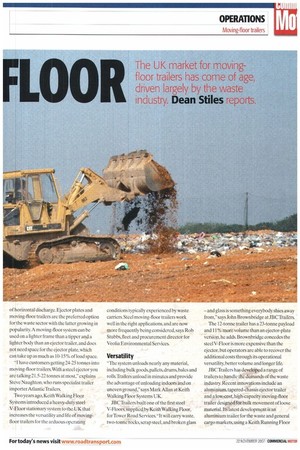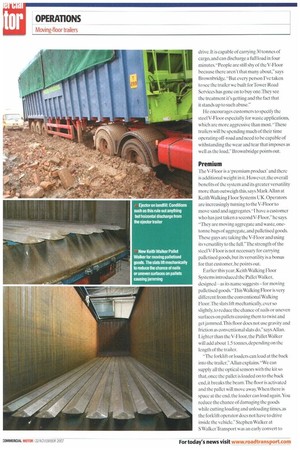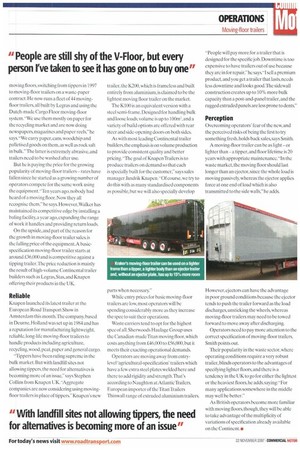T he UK market for moving-floor trailers — b is booming,
Page 62

Page 63

Page 64

Page 65

If you've noticed an error in this article please click here to report it so we can fix it.
with some trailer and body uilders claiming full order books for 2008 and beyond, demonstrating that the selfunloading trailer with its moving floor has come of age in the UK. Within the space of 10 years, these products have moved from being a high-cost, one-off, specialist specification to becoming a viable competitor to tippers, curtainsiders and boxvans.
At fewer than 200 units a year, the British market for moving floor trailers is small, but it is set to reach 300-500 units a year within five years.That's according to Andrew Smith at Newton Trailers, UK agent for Belgium trailer builder Kraker.-We currently sell about 30% of the UK's moving floor systems under the banner of Kraker Trailers," he says."As far as I am aware, we are also about the only active dealer in the used floor market, and we have a hire fleet of this equipment"
Big news
Sales of self-unloading trailers in the UK are dwarfed by those on the Continent where moving floors are set to become the norm, according to leading Continental trailer makers such as Kraker and Stas.
Continental operators have long appreciated the versatility of the moving floor to allow bulk loads as well as palletised loads to be handled, says Smith."The logic is all for moving-floor trailers," he reveals."Their versatility is incredible and, if you spec them correctly, they can do anything you want. In Europe, operators can run from Spain with potatoes then look for any other type of work back. What bulk work can you get back going 1,000 miles?"
Moving floors are equally as effective in small trailers and rigids, and are commonly used by Continental operators for deliveries to high-street outlets.
In this country, the waste industry has led the growth in demand for self-loading trailers, initially with ejector trailers and, more recently, moving-floor trailers because of their versatility. Health and safety concerns have also been a motivator for change especially in the waste industry, where most landfill sites exclude tippers in case they fall over on unstable ground. Increasingly, other centres such as paper mills are prohibiting tipper trailers, so operators must consider some form of horizontal discharge. Ejector plates and moving-floor trailers are the preferred option for the waste sector with the latter growing in popularity.A moving-floor system can be used on a lighter frame than a tipper and a lighter body than an ejector trailer, and does no need space for the ejector plate, which car take up as much as 10-15% of load space.
"I have customers getting 24-25 tonnes into moving-floor trailers. With a steel ejector you are talking 21.5-22 tonnes at most," explains Steve Naughton, who runs specialist trailer importer Atlantic Trailers.
wo years ago, Keith Walking Floor Sy terns introduced a heavy-duty steel V-floor stationary system to the UK that increases the versatility and life of movingfloor trailers for the arduous operating conditions typically experienced by waste carriers. Steel moving-floor trailers work well in the right applications, and are now more frequently being considered, says Rob Stubbs, fleet and procurement director for Veolia Environmental Services.
Versatility
"The system unloads nearly any material, including bulk goods, pallets, drums, bales and rolls.Trailers unload in minutes and provide the advantage of unloading indoors and on uneven ground,says Mark Allan at Keith Walking Floor Systems UK.
JBC Trailers built one of the first steel V-Floors, supplied by Keith Walking Floor, for Tower Road Services. "It will carry waste. two-tonne rocks, scrap steel, and broken glass and glass is something everybody shies away from," says John Brownbridge at JBCTrailers.
The 12-tonne trailer has a 23-tonne payload and 11% more volume than an ejector-plate version, he adds. Brownbridge concedes the steel V-Floor is more expensive than the ejector, but operators are able to recover the additional costs through its operational versatility, better volume and longer life.
JBCTrailers has developed a range of trailers to handle the demands of the waste industry. Recent innovations include an aluminium, tapered-chassis ejector trailer and a low-cost, high-capacity moving-floor trailer designed for bulk movement of loose material. Its latest development is an aluminium trailer for the waste and general cargo markets,using a Keith Running Floor drive. It is capable of carrying 30 tonnes of cargo, and can discharge a full load in four minutes,"People are still shy of the V-Floor because there aren't that many about,"says Brownbridge."But every person I've taken to see the trailer we built for Tower Road Services has gone on to buy one.They see the treatment it's getting and the fact that it stands up to such abuse."
He encourages customers to specify the steel V-Floor especially for waste applications, which are more aggressive than most. "These trailers will be spending much of their time operating off-road and need to be capable of withstanding the wear and tear that imposes as well as the load," Brownbridge points out.
Premium
The V-Floor is a 'premium product' and there is additional weight in it. However, the overall benefits of the system and its greater versatility more than outweigh this, says Mark Allan at Keith Walking Floor Systems UK. Operators are increasingly turning to the V-Floor to move sand and aggregates. '1 have a customer who has just taken a second V-Floor," he says. "They are moving aggregate and waste, onetonne bags of aggregate, and palletised goods. These guys are taking the V-Floor and using its versatility to the full.—The strength of the steel V-Floor is not necessary for carrying palletised goods, but its versatility is a bonus for that customer, he points out.
Earlier this year, Keith Walking Floor Systems introduced the Pallet Walker, designed -as its name suggests -for moving palletised goods.-This Walking Floor is very different from the conventional Walking Floor.The slats lift mechanically, ever so slightly, to reduce the chance of nails or uneven surfaces on pallets causing them to twist and get jammed.This floor does not use gravity and friction as conventional slats do." says Allan. Lighter than the V-Floor, the Pallet Walker will add about 1.5 tonnes, depending on the length of the trailer.
"The forklift or loaders can load at the back into the trailer."Allan explains. "We can supply all the optical sensors with the kit so that, once the pallet is loaded on to the back end,it breaks the beam.The floor is activated and the pallet will move away. When there is space at the end, the loader can load again.You reduce the chance of damaging the goods while cutting loading and unloading times, as the forklift operator does not have to drive inside the vehicle." Stephen Walker at S Walker Transport was an early convert to moving floors, switching from tippers in 1997 to moving-floor trailers on a waste-paper contract. He now runs a fleet of 44 movingfloor trailers, all built by Legras and using the Dutch-made Cargo Floor moving-floor system."We use them mostly on paper for the recycling market and are now doing newspapers, magazines and paper reels," he says."We carry paper, cans, woodchip and palletised goods on them, as well as rock salt in bulk." The latter is extremely abrasive, and trailers need to be washed after use.
But he is paying the price for the growing popularity of moving-floor trailers — rates have fallen since he started as a growing number of operators compete for the same work using the.equipment."Ten years ago, nobody had heard of a moving floor. Now they all recognise them," he says. However,Walker has maintained its competitive edge by installing a baling facility, a year ago, expanding the range of work it handles and providing return loads.
On the upside, and part of the reason for the growth in moving-floor trailer sales, is the falling price of the equipment.A basicspecification moving-floor trailer starts at around £36,000 and is competitive against a tipping trailer:111e price reduction is mainly the result of high-volume Continental trailer builders such as Legras,Stas, and Knapen offering their products in the UK.
Reliable
Knapen launched its latest trailer at the European Road Transport Show in Amsterdam this month. The company, based in Deurne, Holland was set up in 1984 and has a reputation for manufacturing lightweight, reliable, long-life moving-floor trailers to handle products including agriculture, recycling, wood, peat, paper and general cargo.
"Tippers have been ruling supreme in the bulk market. But with landfill sites not allowing tippers, the need for alternatives is becoming more of an issue," says Stephen Collins from Knapen UK. Aggregate companies are now considering using movingfloor trailers in place of tippers." Knapen's new trailer, the K200, which is frameless and built entirely from aluminium, is claimed to be the lightest moving floor trailer on the market.
The K100 is an equivalent version with a steel semi-frame. Designed for handling hulk and loose loads, volume is up to 100m3, and a variety of build options are offered with rear steer and side-opening doors on both sides.
As with most leading Continental trailer builders, the emphasis is on volume production to provide consistent quality and better pricing. "The goal of Knapen Trailers is to produce trailers on demand so that each is specially built for the customer," says sales manager Jandrik Knapen. Of course, we try to do this with as many standardised components as possible, but we will also specially develop parts when necessary."
While entry prices for basic moving-floor trailers are low, most operators will be spending considerably more as they increase the spec to suit their operations.
Waste carriers tend to opt for the highest spec of all. Shenvoods Haulage Group uses the Canadian-madeTitan moving floor, which costs anything from £46,000 to £56,000, but it meets their exacting operational demands.
Operators are moving away from entrylevel 'agricultural-specification' trailers which have a few extra steel plates welded here and there to add rigidity and strength.That's according to Naughton at Atlantic Trailers, European importer of the ThanTrailers Thinwall range of extruded aluminium trailers. -People will pay more for a trailer that is designed for the specific job. Downtime is too expensive to have trailers out of use because they are in for repair," he says."I sell a premium product, and you get a trailer that lasts, needs less downtime and looks good.The sidewall construction creates up to 10% more bulk capacity than a post-and-panel trailer, and the rugged extruded panels are less prone to dents."
Perception
Overcoming operators' fear of the new, and the perceived risks of being the first to try something fresh, holds back sales, says Smith.
A moving-floor trailer can be as light — or lighter than —a tipper, and floor lifetime is 20 years with appropriate maintenance. "In the waste market, the moving floor should last longer than an ejector, since the whole load is moving passively, whereas the ejector applies force at one end of load which is also transmitted to the side walls," he adds.
However, ejectors can have the advantage in poor ground conditions because the ejector tends to push the trailer forward as the load discharges, unsticking the wheels, whereas moving-floor trailers may need to be towed forward to move away after discharging.
Operators need to pay more attention to the correct specification of moving-floor trailers, Smith points out.
Their popularity in the waste sector, where operating conditions require a very robust trailer, blinds operators to the advantages of specifying lighter floors, and there is a tendency in the UK logo for either the lightest or the heaviest floors, he adds, saying: "For many applications somewhere in the middle may well be better."
As British operators become more familiar with moving floors, though, they will be able to take advantage of the multiplicity of variations of specification already available on the Continent.•




















































































































































































